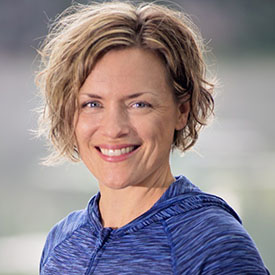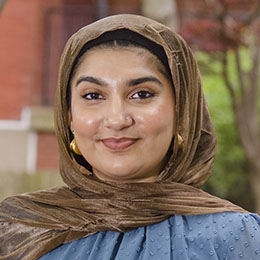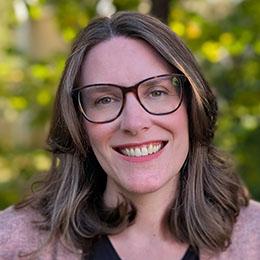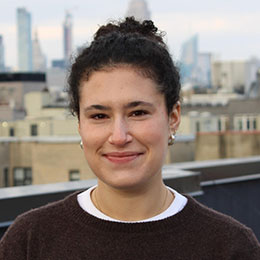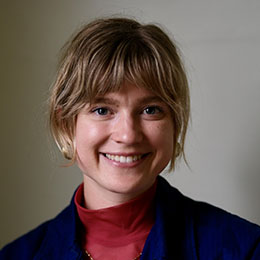Mental health initiatives
Innovative programs and workforce development are preparing future mental health providers.

Social workers are the largest group of mental health providers by occupation in the nation, according to the U.S. Substance Abuse and Mental Health Services Administration. There are more clinically trained social workers – over 200,000 – than psychiatrists, psychologists and psychiatric nurses combined, according to the National Association of Social Workers, citing SAMHSA data.
The VCU School of Social Work is helping to meet the ongoing need for mental health providers and other clinical social workers through a number of initiatives, led by Cassie DeSena-Jacobs, D.S.W., LCSW, the school's director of mental health initiatives and an assistant professor in teaching.
“There’s been a strong need here at VCU and nationally for mental health,” Dr. DeSena-Jacobs says. "We have students who are saying very loudly, ‘We want to be clinicians. We want to work in mental health. What can the School of Social Work do to meet this need?’ The VCU School of Social Work is primed to meet that need."
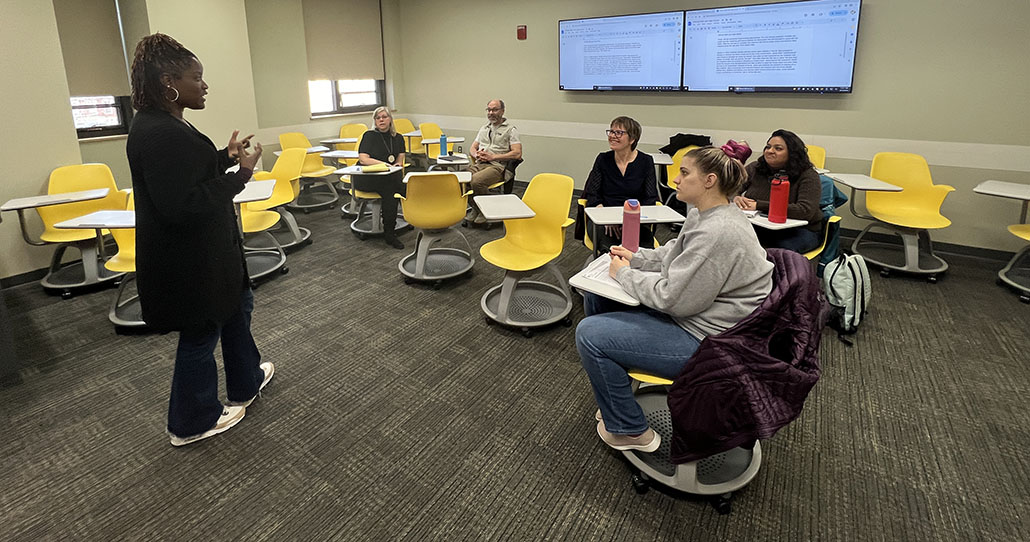
Student engagement opportunities
Design thinking and social work
The School of Social Work and VCU's da Vinci Center for Innovation partnered on a series of introductory Design Thinking workshops for social work students in Spring 2025. "Design thinking" is a non-linear, iterative process to understand users, challenge assumptions, redefine problems and create innovative solutions to prototype and test. It is most useful to tackle ill-defined or unknown problems and involves five phases: Empathize, Define, Ideate, Prototype and Test1.
1Source: Interaction Design Foundation
Fall 2025 schedule: Design Thinking for Mental Health and Well-Being
6-7:30 p.m. ET Tuesday, Oct. 14, Zoom
Explore how creativity, empathy, and collaboration can be used to design better products, services, and programs that support well-being. Through guided activities, you’ll learn the basics of design thinking and practice applying them to real-world mental health challenges. Register
Design Thinking for Social Impact
Around 40 members of the VCU community – including 20 M.S.W. students – participated in Design Thinking for Social Impact at the da Vinci Center for Innovation in April 2025, an exercise in addressing complex mental health challenges. A facilitator explained that LEGOs are a "playful and thought-provoking way of thinking, communicating, and problem solving."
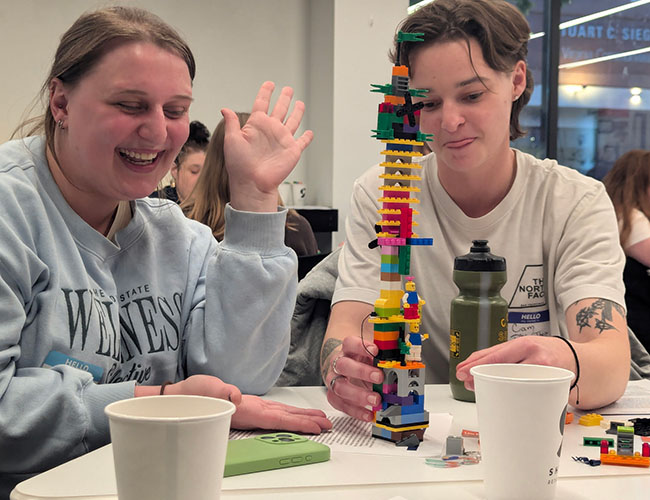

'Pushed to think creatively'
M.S.W. student Keagan Joyce (not pictured) says, "The event pushed me to think creatively about a topic I was unfamiliar with. The conversations were incredibly thought-provoking, and I gained so much insight from collaborating with my peers." A similar sessions is in the works for Fall 2025.
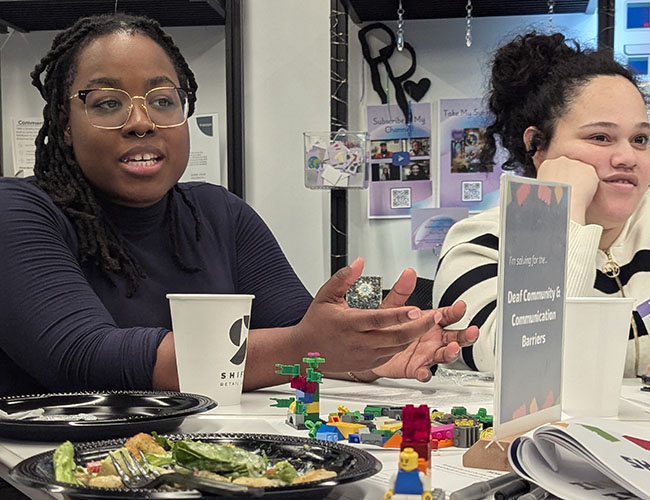

Mental health speed mentoring
Social work alumni and current students will participate in speed mentoring events in Spring 2025 and Fall 2025. Alumni will make 3- to 5-minute pitches on their careers in mental health as they cycle through and talk to each student. Up to 15 students and 15 alumni are expected to attend.
The sessions are open to all social work students, regardless of their academic concentration or interest. The initiative's focus is supporting workforce development.
Hear it from the Professionals Series
Fall 2025 schedule
|
Date |
Time |
Modality |
Details |
Focus |
Facilitator |
|
Monday, Sept. 8 |
6-8 p.m. ET |
In person |
ALC 3100 |
Focus on somatic work. Details |
SSW alum Sherry Klauer (M.S.W.'24), 500RYT |
|
Monday, Nov. 3 |
7-8 p.m. ET |
Online |
Zoom |
Focus on maternal unit, strengthening families. Details |
SSW alum Brittany M. Watson (M.S.W.'22), PMH-C, CHES |
Instructors
Click or tap the links below for bio details.
Academic opportunities
Clinical Skills Labs
Starting in 2024, the School of Social Work has provided multiple clinical skills labs each spring and fall semester, first for M.S.W. students and then for B.S.W. students as well.
These experiential learning opportunities, both in person and virtually, allow students to role-play as practitioner and client, to explore a number of instructor-led scenarios, to ask detailed questions and to engage in deep discussions.
Dr. DeSena-Jacobs leads these initiatives, with support from full-time and community-embedded (adjunct) faculty who serve as instructors.
There will be at least one clinical skills lab every semester with a serious mental illness or mental health focus. When you do clinical work, you work in mental health.” – Cassie DeSena-Jacobs, D.S.W., LCSW, assistant professor in teaching and director of mental health initiatives
Fall 2025 Skills Labs
|
Date |
Time |
Program |
Modality |
Details |
Facilitator |
|
Tuesday, Sept. 30 |
7-8 p.m. ET |
M.S.W. |
Online |
Ebony Watson, LCSW |
|
|
Tuesday, Oct. 7 |
7-8 p.m. ET |
B.S.W. |
In person |
ALC 3100 |
Cassie DeSena-Jacobs, D.S.W., LCSW |
|
Thursday, Oct. 9 |
7-8 p.m. ET |
B.S.W. |
Online |
Cassie DeSena-Jacobs, D.S.W., LCSW |
|
|
Tuesday, Oct. 14 |
11 a.m.- noon ET |
M.S.W. |
In person |
ALC 3100 |
Tara Pappas, LCSW |
|
Tuesday, Oct. 21 |
7-8 p.m. ET |
M.S.W. |
Online |
Erica Jackson, LCSW |
Skills lab instructors
Cassie DeSena-Jacobs, D.S.W., LCSW, is an assistant professor in teaching and director of mental health initiatives at the VCU School of Social Work.
Click or tap the links below for bio details.
Ebony Watson, M.S.W., LCSW
Community-embedded faculty
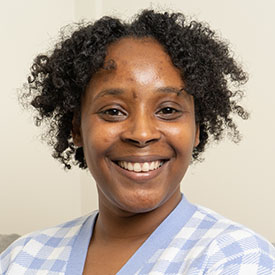

Tara Pappas, M.S.W., LCSW, CSOTP
Community-embedded faculty
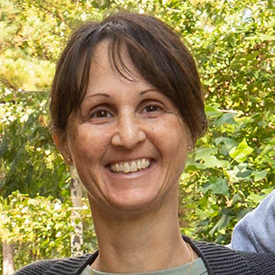

Erica Jackson, M.S.W., LCSW
Assistant professor in teaching
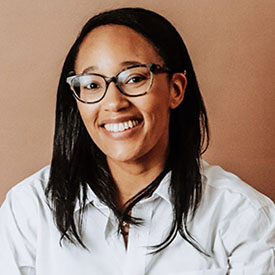

Serious Mental Illness coursework
Treatment of SMI (Serious Mental Illness) Through a Trauma-Informed and Evidence-Based Perspective was introduced in Fall 2023 and has been in high demand ever since. Sections are available for on-campus and online M.S.W. students in the fall and spring.
Our students appreciate coursework that allows them to gain skills they can apply to real-world situations. In the SMI class, students get acquainted with what it's like to work in community mental health. Not only do they learn which therapeutic models they can apply, but they also pick up practical knowledge; for example: how to assist a client who may be experiencing a mental health crisis. – Klara Prachar, M.S.W., LCSW, assistant professor in teaching
The course provides students with an in-depth analysis of the diagnoses that are considered “serious mental illness,” namely treatment-resistant depression, bipolar disorder and schizophrenia. They also learn about screening; treatment models; pharmacology; suicidality and crises; serious mental illness in children and adolescent populations; and the importance of collaboration.
Perhaps most importantly, the course takes an anti-racist lens, providing a historical context of serious mental illness and impacted populations. Students learn how to implement anti-racist materials when working with clients and to understand oppression in an organizational setting. Students create and share infographics on this anti-racist focus.
New & next: Courses, certificates
- Neurobiology of Mental Health launched for M.S.W. students in Spring 2025. Coursework is framed around a mental health lens and how to think about mental health through a biological perspective.
"It's really important when you're working in mental health to understand the way that our brains work, the way that we function, so that we can be better clinicians," Dr. DeSena-Jacobs says. - Mental Health and Practice launched for M.S.W. students in Spring 2025. This case-based class presents students with four cases and assigns them to treatment teams. Students apply material they are learning through the perspective of these cases from real-world practitioners and clients.
"They learn about assessments, they learn about legalities of the mental health system, they learn about mistakes that clinicians make," Dr. DeSena-Jacobs says. "What we hear from students all the time is, 'We want practice experience.' So that's the lens we were thinking about as we built this." - A 12-credit graduate Certificate in Mental Health launches in Spring 2026. Coursework includes:
- SLWK 727 : Trauma & Social Work Practice (3 credits)
- SLWK 762: Treatment of SMI (Serious Mental Illness) Through a Trauma-Informed and Evidence-Based Perspective (3 credits)
- SLWK 763: Neurobiology & Social Work (3 credits)
- SLWK 764: Mental Health Practice (3 credits)
- A 12-credit graduate Certificate in Trauma-Informed Practice is in the planning stages. It would be available as a stand-alone certificate, or students could pair the M.S.W. degree and certificate in 63 credits. Coursework would include:
- SLWK 727 - Trauma and Social Work Practice: Theory, Assessment and Intervention
- SLWK 791 - Racism, Trauma & Resilience
- SLWK 742 - Core Concepts of Child and Adolescent Trauma
- SLWK 791 -Treatment of SMI (Serious Mental Illness) Through a Trauma-Informed and Evidence-Based Perspective
- An 18-credit undergraduate Minor in Mental Health Practice is available for social work and non-social work majors. Coursework includes six electives:
- SWMH 491 - Introduction to the Treatment of Individuals with Mental Illness
- SWMH 493 - Introduction to Trauma and Social Work
- SWMH 494 - Spirituality & Social Work
- SWMH 495 - Mental Health & Criminal Justice: An Intersection of Practice & Policy
- SWMH 496 - Mental Health Case Management and Skills
- SWMH 497 - Substance Use & Co-Occurring Disorders: Screening, Assessment & Treatment
Training and continuing education
Serious Mental Illness webinar series
The School of Social Work will offer its third webinar series on serious mental illness in Spring 2026. Archived content from our spring 2025 and 2024 series is available.
- Serious Mental Illness in Focus: Specialized Topics for Practitioners in 2025 featured a variety of experts, including in the areas of psychiatry, psychopharmacology and at the intersection of bipolar disorder and pregnancy.
- Insights into Serious Mental Illness: A Comprehensive Seminar Series in 2024 included topics on substance use, racial trauma, crisis works, children and adolescents, suicidal ideation and the Virginia legal system.
Continuing education credits are available through the NASW-Virginia Chapter, and digital badges are provided for participants who attend all sessions. Recordings of most sessions are available online. Courses are free for social work students, faculty and staff, and discounted for others with school connections.
Training for clinical practitioners & clinical supervision training
The School of Social Work will provide a variety of continuing education training opportunities around clinical practice and supervision in Spring 2026. Click or tap the links below to view details on our continuing education page.
Spring 2026
- Clinical Supervision Training
9 a.m.-3:30 p.m. ET Friday, Feb. 6-Saturday, Feb. 7, Zoom - The Creative Brain: How Expressive Arts Rewire Neural Pathways for Emotional Healing
6-8 p.m. ET Tuesday, Feb. 24, Zoom - Clinical Supervision Refresher
9 a.m.-3:30 p.m. ET Friday, March 6, in-person - Clinical Supervision Training
9 a.m.-3:30 p.m. ET Friday, April 17-Saturday, April 18, in-person - Recognizing and Responding to Gender-Based Violence in Social Work Practice
TBD, Zoom - Culturally Adapting the CBITS (Cognitive Behavioral Intervention for Trauma in Schools), an Intervention for Youth Exposed to Trauma
TBD, Zoom
Clinical supervision training is interactive and includes multiple learning modalities such as case study, didactics, videos, self-assessment and discussion.
Spring 2025 sessions included supervision training for both LCSWs and LPCs and included a collaboration with instructors from the VCU College of Health Professions, Rehabilitation Counseling.
Mental health first aid
.png)
Mental Health First Aid is a course that teaches participants how to identify, understand and respond to signs of mental illnesses and substance use disorders. Anyone can be trained in mental health first aid, and the VCU School of Social Work will be providing trainings in this. Interested in becoming a Mental Health First Aider? Please contact Dr. DeSena-Jacobs at jacobsc2@vcu.edu.
De-escalation training
Dr. DeSena-Jacobs has worked with faculty and staff from VCU's Cabell Library to work on de-escalation training. The De-escalation Guidelines and Training Taskforce (DEGTT) has developed guidelines and a training plan to equip library employees working in public service environments with a set of strategies for de-escalating challenging situations. These materials will include both general strategies for navigating escalated situations, and context-specific content (such as contact information for other VCU units that can assist in the moment).
